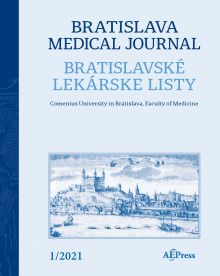Journal info
|
||||
Select Journal
Journals
Bratislava Medical Journal 2024 2023 2022 2021 2020 2019 2018 2017 2016 2015 2014 2013 2012 Ekologia - Ecology Endocrine Regulations General Physiology and Biophysics Neoplasma Acta Virologica Studia Psychologica Cardiology Letters Psychológia a patopsych. dieťaťa Kovove Materialy-Metallic Materials Slovenská hudba 2025Webshop Cart
Your Cart is currently empty.
Info: Your browser does not accept cookies. To put products into your cart and purchase them you need to enable cookies.
Bratislava Medical Journal Vol.125, No.2, p.84–91, 2024 |
||
| Title: Short-term autophagy inhibition by autophinib or SAR405 does not alter the effect of cisplatin on ATP production in prostate cancer cells | ||
| Author: Monika KRATOCHVILOVA, Petr STEPKA, Martina RAUDENSKA, Jan BALVAN, Lukas RICHTERA, Natalia CERNEI, Dagmar STERBOVA SKOPALOVA, Ondrej ZITKA, Petr FILIPENSKY, Petr BABULA, Michal MASARIK | ||
| Abstract: OBJECTIVES: Cisplatin is a widely used anticancer drug for the treatment of many solid cancers. DNA damage is thought to be the key mechanism of cisplatin’s anticancer activity. However, cisplatin may also affect cellular metabolism. The aim of this study was to determine the effect of cisplatin on the types of ATP production (OXPHOS versus glycolysis) and their rate in prostate cancer cells and to determine the potentially protective effect of autophagy and amino acids during cisplatin treatment. We also wanted to investigate the potential synergy between the metabolic effects of cisplatin on ATP production and the inhibition of autophagy. METHODS: Cisplatin treatment can significantly affect the metabolism of cancer cells. Important metabolic pathways can be altered, leading to changes in energy production and nutrient utilization. Autophagy and amino acid pool modulations can serve as protective mechanisms significantly affecting tumor cell survival under metabolic stress caused by anticancer treatment. By enabling the recycling of amino acids, autophagy helps cancer cells maintain cellular homeostasis and overcome nutrient limitations. Thus, inhibition of autophagy could have a supportive effect on the metabolic effects of cisplatin. RESULTS: After cisplatin treatment, ATP production by way of OXPHOS was significantly decreased in 22Rv1 and PC-3 cells. On the other hand, ATP production by glycolysis was not significantly affected in 22Rv1 cells. DU145 cells with dysfunctional autophagy were the most sensitive to cisplatin treatment and showed the lowest ATP production. However, short-term autophagy inhibition (24h) by autophinib or SAR405 in 22Rv1 and PC-3 cells did not alter the effect of cisplatin on ATP production. Levels of some amino acids (arginine, methionine) significantly affected the fitness of cancer cells. CONCLUSION: Persistent defects of autophagy can affect the metabolic sensitivity of cancer cells due to interference with arginine metabolism. Amino acids contained in the culture medium had an impact on the overall effect of cisplatin (Fig. 3, Ref. 38). |
||
| Keywords: cisplatin, autophagy inhibition, amino acids, prostate cancer | ||
| Published online: 25-Oct-2023 | ||
| Year: 2024, Volume: 124, Issue: 2 | Page From: 84, Page To: 91 | |
| doi:10.4149/BLL_2024_013 |
||
|
|
 download file download file |
|

